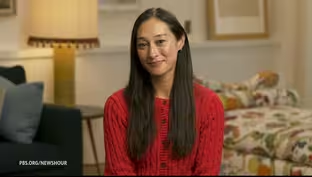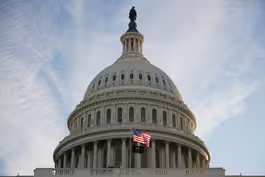
Tamara Keith and Amy Walter on GOP support for Trump budget
Clip: 6/2/2025 | 9m 24sVideo has Closed Captions
Tamara Keith and Amy Walter on Trump's budget and GOP support for cuts
NPR’s Tamara Keith and Amy Walter of the Cook Political Report with Amy Walter join Amna Nawaz to discuss the latest political news, including the big week ahead for Republicans and the Trump agenda on Capitol Hill and a new poll shows how young voters view the parties and their leadership.
Problems playing video? | Closed Captioning Feedback
Problems playing video? | Closed Captioning Feedback
Major corporate funding for the PBS News Hour is provided by BDO, BNSF, Consumer Cellular, American Cruise Lines, and Raymond James. Funding for the PBS NewsHour Weekend is provided by...

Tamara Keith and Amy Walter on GOP support for Trump budget
Clip: 6/2/2025 | 9m 24sVideo has Closed Captions
NPR’s Tamara Keith and Amy Walter of the Cook Political Report with Amy Walter join Amna Nawaz to discuss the latest political news, including the big week ahead for Republicans and the Trump agenda on Capitol Hill and a new poll shows how young voters view the parties and their leadership.
Problems playing video? | Closed Captioning Feedback
How to Watch PBS News Hour
PBS News Hour is available to stream on pbs.org and the free PBS App, available on iPhone, Apple TV, Android TV, Android smartphones, Amazon Fire TV, Amazon Fire Tablet, Roku, Samsung Smart TV, and Vizio.
Providing Support for PBS.org
Learn Moreabout PBS online sponsorshipAMNA NAWAZ: Well, it's shaping up to be a big week for Republicans and the Trump agenda on Capitol Hill.
Here to delve deeper into the politics of it all is Amy Walter of The Cook Political Report With Amy Walter and Tamara Keith of NPR.
Great to see you both.
TAMARA KEITH, National Public Radio: Hello.
AMY WALTER, The Cook Political Report: Good to see you.
AMNA NAWAZ: So, as Lisa was reporting earlier, that Republican budget bill now moves to the Senate.
We know some Republican senators have some concerns.
Some say not enough cuts.
Some are concerned about Medicaid cuts.
I'm sure you both saw Iowa Senator Joni Ernst took some questions about those concerns in a Friday town hall.
A constituent said people will die as a result.
She said: "Well, we're all going to die."
She doubled down on that with a post over the weekend.
Here's what she shared.
SEN. JONI ERNST (R-IA): I made an incorrect assumption that everyone in the auditorium understood that, yes, we are all going to perish from this earth.
So I apologize.
And I'm really, really glad that I did not have to bring up the subject of the Tooth Fairy as well.
AMNA NAWAZ: So, Tam, Senator Ernst has become sort of the poster child for Democrats' anger around this.
But what happens when the bill goes to Senator Ernst and the other senators?
What happens next?
TAMARA KEITH: I can tell you that President Trump is working on this right now.
We know that he had a call with Senator Josh Hawley of Missouri, who is someone who has been raising concerns about Medicaid cuts being political poison.
Hawley then tweeted today that there will be no cuts to Medicaid benefits.
This is very much a rhetorical battle that is taking place where Republicans and the White House are insisting that Medicaid will not be cut, it will just be waste and abuse.
There's going to be a raging fight for public opinion about this in the days and weeks ahead.
But the idea of getting Josh Hawley under the tent, getting this senator who has been openly critical of the House cuts to now be on message, at least in this one tweet, is an indication that the White House is really working to get and essentially demanding that Republicans are all in line, all Republicans vote for this.
And the message that I got from a White House official I was just talking to moments ago was that they really do view the House bill as a necessary framework, that the bones of the House bill need to be what makes it out of the Senate, because the House so narrowly passed it.
So senators are under a lot of pressure from the president.
AMNA NAWAZ: So, the bones of the bill, Amy, does that say to you Republicans in the Senate won't make big changes?
AMY WALTER: Well, I think there's -- we're at this point where it's too big to fail and that there isn't much choice now for senators in what they're able to be able to carve out.
But I think what Tam brought up with Senator Hawley is a really good point, which is here's a great opportunity for you as an elected member to show your constituents that you really care about a certain issue.
You can make the argument that you brought it in front of the president, the president made accommodations to you.
This is a very good political tool.
I think what we're seeing with that response from Senator Ernst is also an example of the fight that is going to be happening, and it is already happening, over the marketing around this bill.
Republicans are convinced that many of these town halls -- this was her response was in a town hall that was very -- that it wasn't exactly a friendly audience.
And their perspective is, these are just liberal activists, these are not regular voters.
Once regular voters understand we're only talking about waste and abuse, we're not talking about kicking needy people over Medicaid, we will win, the polls show this.
Democrats, of course, feel very differently.
They say the polls show that Medicaid is really popular, we're going to make this the centerpiece of our campaign.
And so the fight now is on to really define the bill, but internally, on Capitol Hill, I think the reality is, it is going to be something that not everybody is going to like, but they have to pass it.
TAMARA KEITH: And I think for the Republicans, one of the challenges is that the Congressional Budget Office, which is this independent arbiter, has said that millions of people will lose Medicaid coverage... and that this legislation would add to the deficit.
AMY WALTER: Right.
TAMARA KEITH: Those are -- so then you have the House speaker sort of arguing about whether the Congressional Budget Office is really doing math the right way.
AMNA NAWAZ: Calling into question the CBO in the first place.
We will have to talk more about that, but the backdrop for all of this, of course, is what -- the CNN poll from over the weekend I want to put to you.
And it showed the majority of Americans, 58 percent, are saying that they feel the government should be doing more to solve problems, 41 percent saying the government's doing too much.
That's really -- Tam, that's a reversal of a 20-year trend.
Is that saying to you that people are concerned about some of the Trump administration changes, how fast they're going?
TAMARA KEITH: Certainly, those changes have gotten a lot of focus and a lot of attention and things like problems at the National Park Service or the person who has the key to the bathroom at Yosemite being one of the people who was let go.
Those sorts of stories are breaking through.
I think that -- the analogy I think of with this is the Affordable Care Act, which was very unpopular.
Obamacare was not a popular program until Republicans in Congress started taking action to take it away.
And then, suddenly, as this battle raged, people learned about what the Affordable Care Act did, discovered that things that they liked were actually part of this Obamacare that they thought they disliked.
And it became much more popular when there was a risk of it going away.
AMNA NAWAZ: Amy, there's another part of the CNN poll I want to put to you about leadership.
They asked if -- quote -- "the party with strong leaders" described either Democrats, Republicans, or neither; 40 percent of those polls said Republicans, 16 percent said Democrats, 43 percent said neither.
But you wrote this week about Democrats being stuck in what you call a cringe trap.
Tell us more about that.
AMY WALTER: Well, the first thing to note about this poll is that part of the reason the Democratic number is so low is that very few Democrats believe that their own party has leadership.
So that is a big important point to make.
In terms of the cringe trap, I was really looking at this challenge that Democrats are having right now, and they're spending a lot of money to try to figure out, how they get back voters that they used to think of as their core constituents, younger voters.
How did the party associated with youth become so unable to communicate with younger people?
And I think, at the end of the day, really what we have seen are two things.
The first is younger voters have been telling Democrats, Democratic voters, younger Democratic voters in primaries, who they would like to be their nominee.
And that person was Bernie Sanders, both in 2016 and 2020.
And both times the party said, sorry -- well, voters in the party said, sorry, we're picking this person and you have to vote for them.
So there's that built-up frustration.
The second part is Democrats for so long have assumed that, because younger voters are theirs, they just have to turn them out.
They don't have to persuade them.
And the cringe comes in the ways in which they're trying to figure out how to persuade them.
They seem to have lost any ability to understand how those younger voters in this era communicate both online and with each other.
AMNA NAWAZ: Well, related to that, we just saw Connecticut Senator Chris Murphy announce today a new PAC that he's going to spend, he expects some $2 million, not just on fighting Medicaid tests, but also, Amy, to your point, registering more young voters.
And that comes in the context of we're seeing other potential 2028 contenders out there out there in early primary states.
AMNA NAWAZ: We saw Tim Walz, Wes Moore, J.B. Pritzker, Pete Buttigieg.
Tam, quickly here, so I can get to both of you, but are we seeing competing visions for the Democratic Party moving forward?
TAMARA KEITH: I don't know that they are actually saying vastly different things from each other.
I think that all of those people who you named are, broadly speaking, in the establishment part of the Democratic Party.
And what Amy is talking about here is that many Democratic voters have been crying out for something different from the establishment.
But we're a long way off.
And all of these things that they're doing are sort of the things that you do when you think you might be president someday.
AMY WALTER: Yes.
And when you give away money, you also are offering that those favors come back to you, so to candidates, to local organizations, to grassroots groups, that if you decide to run for president, you go back to those people and say, remember how I helped you out.
But I think they're trying to fill in that poll number, that gap, which is, who stands -- who, Democrats, do you think would be a great stand-in in your party as a leader?
And, right now, that is a huge vacuum that a lot of different people are trying to fill.
AMNA NAWAZ: With a good amount of time... AMY WALTER: And with a lot of time.
AMNA NAWAZ: ... until 2028.
But we're still having the conversation.
And I appreciate you both for doing that.
AMNA NAWAZ: Amy Walter, Tamara Keith, always great to see you.
Thank you.
AMY WALTER: Thank you.
TAMARA KEITH: You're welcome.
A Brief But Spectacular take on big talk
Video has Closed Captions
Clip: 6/2/2025 | 3m 38s | A Brief But Spectacular take on big talk (3m 38s)
Congress expects Trump request to cut approved funding
Video has Closed Captions
Clip: 6/2/2025 | 5m 49s | Congress expects Trump request to cut funding already approved as big bill faces hurdles (5m 49s)
How the Trump administration plans to slash NASA's budget
Video has Closed Captions
Clip: 6/2/2025 | 9m 38s | How the Trump administration's plans to slash NASA's budget will impact science (9m 38s)
News Wrap: 3 killed, dozens hurt heading to Gaza aid site
Video has Closed Captions
Clip: 6/2/2025 | 5m 29s | News Wrap: 3 killed and dozens more hurt heading to Gaza aid distribution site (5m 29s)
Police say makeshift flamethrower used in Boulder attack
Video has Closed Captions
Clip: 6/2/2025 | 3m 52s | Investigators say man used makeshift flamethrower in attack on pro-Israel group in Boulder (3m 52s)
Ukrainian drone attack deals major blow to Russian bombers
Video has Closed Captions
Clip: 6/2/2025 | 7m 15s | As delegations meet for ceasefire talks, Russia reels from Ukrainian drone attacks (7m 15s)
Providing Support for PBS.org
Learn Moreabout PBS online sponsorshipSupport for PBS provided by:
Major corporate funding for the PBS News Hour is provided by BDO, BNSF, Consumer Cellular, American Cruise Lines, and Raymond James. Funding for the PBS NewsHour Weekend is provided by...

















